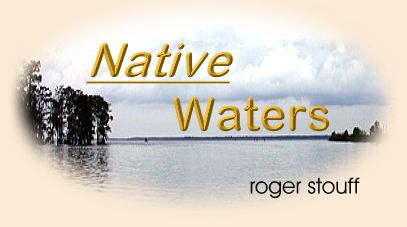|
Since January 1, Louisiana has lost 67
million square yards of itself.
Decades of tinkering with nature, of trying
to contain that mightiest of all rivers, the
Mississippi, have taken their toll. Louisiana
is dimin-ishing at a remarkable, shocking rate.
There's no use blaming anyone. The control
of nature has long been a futile, hazardous
proposition. We are simply left with a legacy
of futility, one which the entire nation will
suffer.
But every 38 minutes, an area the size of a
football field vanishes in Louisiana. Gone.
In the last century alone, 1.2 million acres
of land is gone. Another 435,000 acres will
vanish over the next half century. These two
combined equal an area the size of Delaware,
Washington D.C. and the Baltimore, Maryland
area together.

In the geologic past, the Mississippi River
frequently changed its course, fanning out
across the coast of Louisiana to create a
rich fertile coastline. Some existing bayous
are former channels of the Mississippi, most
especially the Atchafalaya River, my native
waters. Just in my lifetime, the loss of
wetlands due to constricting the flow of the
Atchafalaya has been devestating. The Mississippi
wants to go back down the route of the Atchaflaya,
but "we" can't allow that. It would mean devestation
of epic proportions.
Instead, we fight the Old Man
tooth and nail. We will, eventually, fail.
The Atchafalaya remains an active river delta,
which is good news for my immediate area of the
coast. But the entire basin area is also drying
up, part of the problem of coastal restoration.
Its flow is restrained and a rich ecological
system is dying.
Yet the lack of that delta deposit is, among
other things, equally destructive. Consider
that over a quarter of all oil and gas this
nation relies on traverses Louisiana on tankers,
barges or pipelines. What does coastal loss have
to do with this? Most of these channels and roads,
as well as the areas where pipelines are located,
are vanishing along with the coast. Our barrier
islands and wetlands are buffers protecting us
from hurricanes. A major storm, of Hurricane
Andrew proportions, would have far-reaching
effects on oil distribution in the United
States. Just look what the recent spate of
hurricanes this summer did to gas prices.
Losing ports, channels and roadways that
crumble off into the bay means commerce
cannot function as it has for decades. One
billion pounds of commercial fishing is at
stake. Ninety-five percent of all marine
life in the Gulf of Mexico use the coastal
marshes for many parts of their lives, not
the least of which is spawning. It is the
wintering habitate for more than five million
waterfowl and migratory birds. Commercial
fishing ammounts to $343 million in revenue.
Recreational fishing is a $703 million
industry at minimum.

What you're looking at is a loss of energy,
loss of seafood production, loss of recreation
opportunities and loss of infrastucture that
the entire nation depends on. While Louisiana
has been and remains something of a humor
subject, in light of our politics and the
like, the United States depends upon this
state for far more than most folks realize.
It will cost about $14 billion to save our
coast. If it can even be saved. If we don't
try, more than $100 billion in losses are
expected in the following years, for the
entire nation. The $14 billion pricetag
includes sediment diversions, marsh creation,
barrier island restoration, shoreline protection,
delta management, river water re-introduction,
sediment and nutrient trapping and vegetative
planting.
So I submit to you: If the disaster were unfolding
elsewhere, would you be willing to help? If the
Grand Canyon were filling up with sand, if the
sequoia forests were burning, if the Grand Banks
were being threatened? Louisiana, as one writer
pointed out, has the misfortune of being a poor
state, without much political clout, in the South.
So if it wasn't Louisiana, if it was Connecticut
or Montana or the Carolinas...would it make a
difference?
National Geographic magazine recently began
a poll asking if the nation should spend $14
billion to save Louisiana's coast. The results
so far are an overwhelming Yes! Over 90 percent,
in fact.
It's not just a Louisiana problem. Most of
the gulf states suffer the same loss of
wetlands, though not as severe as Louisiana.
We need help, to help all of us.
Please take the poll and show your support at:
http://magma.nationalgeographic.com/ngm/0410/feature5/
For further information, consider these sources:
First and foremost, I highly recommend beyond
anything else on the subject:
Bayou Farewell: The Rich Life and Tragic
Death of Louisiana's Cajun Coast by Mike Tidwell.
America's Wetland at http://www.americaswetland.com/
LACoast at http://www.lacoast.gov/
Louisiana Department of Natural Resources at
http://www.dnr.state.la.us/crm/
Louisiana Coastal Area Ecosystem Restoration
Plan at www.lca.gov
Atchafalaya Basin Project at http://dnr.louisiana.gov/sec/atchafalaya/
~ Roger
|



